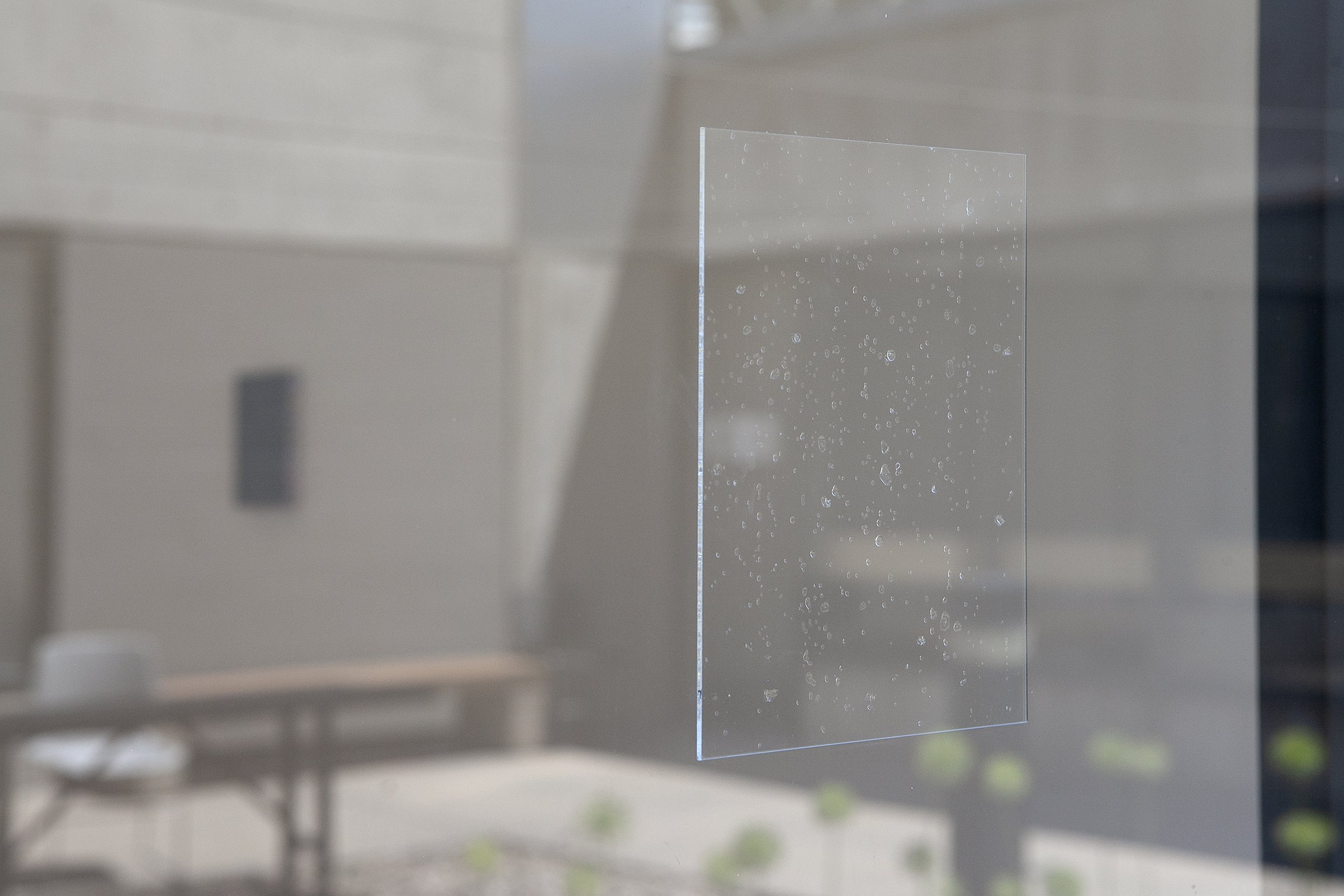We are no longer beings but sensations, 2023
Solo exhibition, DXIX Projects, Office K102A, Department of Art and Art History, Colorado State University, April 6 - September 30, 2023
DXIX is pleased to present We are no longer beings but sensations, a solo exhibition project by artist Marina Kassianidou. This project is a site-responsive installation of works that fit within and are framed by existing elements in the space of K102A Office. The works primarily include paintings and collages on patterned fabrics, engineered wood, and wood-patterned vinyl. These mass-produced surfaces are commonly found in domestic spaces, forming part of the constructed interior landscapes in which we exist.
Due to the artist’s process of working and her sometimes small and subtle gestures, confusion arises between the printed images, the collaged marks, the natural marks, and the painted marks. The works sometimes emerge as paintings, sometimes as collages, and sometimes as readymade fabrics or as pieces of wood. They, thus, challenge the viewers’ eyes, asking them to pay attention to seemingly straightforward materials. Marina’s interventions turn these materials into objects of study and visual excavation, bringing them to the foreground while uncovering their complexity and contradictions. She aims for a gradual shift in perception, an increase in awareness and sensitization that partially turns these materials and the space itself into a field of sensations. Marina’s interventions provoke a re-signification of their surrounding built environment. Her interventions perform as arrows that point at this specific site (the office environment) enhancing aesthetic agencies latent in its everyday functional appearance. As a result of this process, the everyday office work environment becomes the subject of careful aesthetic consideration and observation. Ordinary details from walls, windows, carpet, shelf, table, chairs, outlets, sideboards, surfaces, textures, colors, now become remarkable formal events surfacing from the realm of the uneventful, barely visible mundane, and presenting themselves to the viewer as a baroque ensemble of visual experiences. Marina’s work seems to be aligned with those poetics of “the endotic.” The endotic is an artistic or literary practice that focuses on the ordinary as opposed to the extraordinary. However, in an interesting plot twist, the ordinary or minor in Marina’s work is rich and exuberant.
Marina Kassianidou was born in Limassol, Cyprus, and currently lives and works between Limassol and Boulder, Colorado, USA. She has a B.A. in Studio Art from Stanford University, an M.A. in Fine Art from Central Saint Martins College of Art and Design, and a Ph.D. in Fine Art from Chelsea College of Arts, London, UK. Her work has been exhibited internationally at spaces such as the House of Cyprus (Athens, Greece), NiMAC (Nicosia, Cyprus), Thkio Ppalies (Nicosia, Cyprus), The Center for Drawing UAL (London, UK), Tenderpixel Gallery (London, UK), Stand4 Gallery (Brooklyn, New York), Yes Ma’am Projects (Denver, Colorado), GEORGIA (Denver, Colorado), Lane Meyer Projects (Denver, Colorado), east window (Boulder, Colorado), and Rule Gallery (Marfa, Texas). She has been awarded fellowships and residencies at the Ragdale Foundation, Hambidge Center, Can Serrat, Ox-Bow, and The Studios at MASS MoCA, among others. She is a recipient of the 2016 Joan Mitchell Foundation Painters and Sculptors Grant. She is currently Assistant Professor in Art Practices at the University of Colorado Boulder. Through her works, she approaches mark making as a mode of becoming attentive and as a way of responding and relating to something other—a surface, a space, the world around us. Marina primarily works with materials that can be found in her immediate surroundings, such as patterned fabrics, engineered wood, and actual walls and floors. Rather than being the physical support for her marks, these surfaces become an integral part of the work. Her marks/interventions depend on features of each surface, leading to an interweaving between her actions and the pre-existing materials. In a sense, her interventions excavate each surface, drawing attention to its features, histories, and potentially unseen narratives.
The exhibition is accompanied by a small online and physical publication with a text by Maria Petrides: https://issuu.com/dxixprojects/docs/we_are_no_longer_beings_booklet_embedded


![Gradient II ( Variants series) Acrylic on patterned cotton fabric 6 x 8 x 0.875 inches [Fabrics designed by artist to capture her imperfect memories of fabrics her late grandmother Nina had used to make her clothes as she was growing up.]](https://images.squarespace-cdn.com/content/v1/5d162e4b55d8de000110db89/1703250554067-G186103SSUEOFINW8UYS/sensations_03.jpg)

![Gradient IV ( Variants series) Acrylic on patterned cotton fabric 6 x 8 x 0.875 inches [Fabrics designed by artist to capture her imperfect memories of fabrics her late grandmother Nina had used to make her clothes as she was growing up.]](https://images.squarespace-cdn.com/content/v1/5d162e4b55d8de000110db89/1703255036988-S32VW8YCBOV7JO49CJ27/image-asset.jpeg)















